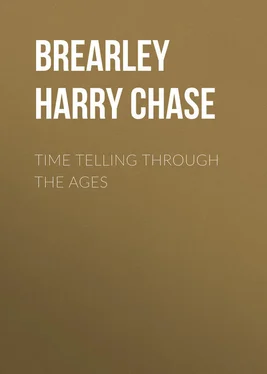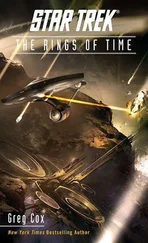Harry Brearley - Time Telling through the Ages
Здесь есть возможность читать онлайн «Harry Brearley - Time Telling through the Ages» — ознакомительный отрывок электронной книги совершенно бесплатно, а после прочтения отрывка купить полную версию. В некоторых случаях можно слушать аудио, скачать через торрент в формате fb2 и присутствует краткое содержание. Жанр: foreign_antique, foreign_prose, на английском языке. Описание произведения, (предисловие) а так же отзывы посетителей доступны на портале библиотеки ЛибКат.
- Название:Time Telling through the Ages
- Автор:
- Жанр:
- Год:неизвестен
- ISBN:нет данных
- Рейтинг книги:4 / 5. Голосов: 1
-
Избранное:Добавить в избранное
- Отзывы:
-
Ваша оценка:
- 80
- 1
- 2
- 3
- 4
- 5
Time Telling through the Ages: краткое содержание, описание и аннотация
Предлагаем к чтению аннотацию, описание, краткое содержание или предисловие (зависит от того, что написал сам автор книги «Time Telling through the Ages»). Если вы не нашли необходимую информацию о книге — напишите в комментариях, мы постараемся отыскать её.
Time Telling through the Ages — читать онлайн ознакомительный отрывок
Ниже представлен текст книги, разбитый по страницам. Система сохранения места последней прочитанной страницы, позволяет с удобством читать онлайн бесплатно книгу «Time Telling through the Ages», без необходимости каждый раз заново искать на чём Вы остановились. Поставьте закладку, и сможете в любой момент перейти на страницу, на которой закончили чтение.
Интервал:
Закладка:
We now have glanced briefly at a few of the features of early humanity's dependence upon the clocks of nature and the way in which they influenced its manner of life. We still depend upon these great primeval timepieces and we do it for the most part unconsciously, for our master clocks must still be set by the motion of the heavenly bodies.
That motion, which now we know to be really the revolution of our earth, is still the legislator and supreme court of time. But we have learned to make and carry everywhere a wonderful machine, whose revolving wheels and pointing hands keep tryst with the stars in the heavens and move to the rhythm of wheeling worlds. And so familiar is this talisman of man's making, that we forget to look beyond it or think of time at all save as the position of the hands upon the dial.
We carry with us carelessly a toy which tells tales upon the solar system – our watch is a pocket universe.
CHAPTER THREE
How Man Began to Model After Nature
We now have reached a point far ahead of our story and must take a backward step. We have been seeing man as a mere observer of nature; but man doesn't stop with nature as he finds it – his man-brain drives him forward; he must make improvements of his own. Animals may live and die and leave no trace save their bones, which for the most part soon disappear, but man always leaves traces behind him. He has always interfered with nature, or rather has modeled after nature, seeing in her work the revelations of principles and laws that he might utilize in varying ways for his own benefit and progress. Our material civilization is built up from the accumulated results of all this study and control of nature by hundreds of millions of busy brains and hands, through tens of thousands of years.
Here we are, then, living, in a sense on the top of the ages of human history, like the dwellers on a coral island. Hundreds of generations have toiled to raise the vast structure for us, like the little coral "polyps" which build their own lives into the mass, yet we take it all as a matter of course and rarely give a thought to the marvelous ways by which it has come about. You may have just glanced at your watch. To you, perhaps, a watch has always seemed merely a small mechanism which was bought in a store. That is true, and yet – remember this – the first manufacturer who had a hand in producing that watch for you, may have been a caveman.
In order to appreciate this development, let us return, therefore, for another rapid view of prehistoric times; life in its crudest form – one day much like another – a scanty population, huddled in little groups in places naturally sheltered – the simplest physical needs to be provided for – little thought of the past or care for the future – time-reckoning reduced to the single thought of appointment – no reason for measuring intervals – in these and other respects antiquity presented the greatest possible contrast to our complicated modern life.
The long-armed man of our first chapter noticed that as the sun moved, the shadows of the cliff also moved, as did all other shadows. As he formed habits of regularity, it was natural for him to perform a certain daily act when, perhaps, the shadow of a certain tree touched upon a certain stone. This would be a natural sun-dial.
But a thinner, sharper shadow would be easier to observe; suppose, therefore, that some successor to the long-armed man set up a pole in some open space and laid a stone to mark the spot where the shadow fell when the sun was highest in the heavens. That would be an artificial sun-dial — a device deliberately planned to accomplish a certain purpose . The man who first took such a step was probably the first manufacturer who had a hand in supplying you with your watch. The shaggy mammoth, the terrible saber-tooth tiger and the eohippus, the small ancestor of our modern horse, must have been familiar sights when time-recording at the hands of some rude, unconscious inventor thus began the long story of its development.
One stone reached by the moving shadow would mark only one point of time each day. Why not place two stones, three stones, or even more and get more markings? Such a procedure would be more useful because it would indicate the time of other happenings in the course of the day. The sun would pass across the skies and the shadow must travel around the pole. What more natural than to place the stones in a circle and get a series of these markings?
Of course, as the ages passed, life became more complex – not complex as we would consider it to-day, but, as compared with its rude beginnings. New habits were formed, new needs developed, new activities were undertaken at different periods.
Here, then, was the sprouting of modern civilization – the beginning of that specializing of each man in his own particular direction that has carried the world to its present high state of expertness in so many fields. Slowly steadily, and inevitably this principle of specialization has been developed. With the increase of laws, for example, certain men came to give them special study and then to sell their knowledge and skill to other men who had no opportunity for such study. In course of time, the aggregation of laws became so great that these lawyers were forced to specialize among themselves; to-day, therefore, we find a number of classes of law specialists. The same thing is true of doctors who have limited their practise until we find those who treat the eye only, or the lungs, the stomach, or the teeth. Even the treatment of the teeth has been subdivided, some dentists limiting themselves to extraction and some of them even to the treatment of a single disease of the gums.
Engineering, too, has branched like a tree and the branches have branched again and yet again. Electrical engineering has come to be divided into so many departments that telephone companies employ specialists in many branches of the engineering profession.
We find the same conditions in any field of thought or activity – all commercial and industrial life is divided and subdivided; labor is specialized; writing is specialized; teaching is specialized; even warfare has become a contest between many kinds of trained specialists, each employing the tools of his trade; and every man's outlook upon life is directed chiefly toward the particular corner of the particular field that he has fitted himself to occupy.
The first step toward this complex condition of the modern world was taken when each man stopped getting his own food, making his own weapons, and providing for all his individual wants without dependence upon others. When he learned to exchange that which he could best produce for that which some other man had learned to make better than he, the human race unconsciously turned away from the status of the birds and the beasts and began the long, slow upward climb that history records.
It was, then, through trade, barter and exchange that man began to acquire the manners of civilized life. Trade itself became a specialized activity, and dealers who did nothing but buy and sell, but themselves produced no material goods, found that a special calling was rightfully theirs. The modern merchant is the heir of one of the first "specialists" in human activity, and the misunderstood work of the so-called "middleman" is one of the bases of modern civilization – a necessary and honorable calling.
Civilization is a thing of the spirit, but it has the support of material things and it has been truly said that the degree of a people's civilization can be measured by the multiplicity of its needs. The savage is content with food, shelter and a covering for his body, but every step in civilization's progress has a more and more complex material accompaniment, and these interwoven relationships of modern life in which the question of time is a most important factor can only be sustained through the use of accurate time-measure. In other words, modern civilization leans upon the watch.
Читать дальшеИнтервал:
Закладка:
Похожие книги на «Time Telling through the Ages»
Представляем Вашему вниманию похожие книги на «Time Telling through the Ages» списком для выбора. Мы отобрали схожую по названию и смыслу литературу в надежде предоставить читателям больше вариантов отыскать новые, интересные, ещё непрочитанные произведения.
Обсуждение, отзывы о книге «Time Telling through the Ages» и просто собственные мнения читателей. Оставьте ваши комментарии, напишите, что Вы думаете о произведении, его смысле или главных героях. Укажите что конкретно понравилось, а что нет, и почему Вы так считаете.












